小学3到6年级英语知识点
新版人教版pep小学英语3至6年级知识点归纳

..PEP新版三年级上册复习资料ruler(尺子) pencil (铅笔) eraser(橡皮) crayon(蜡笔)bag (书包) pen (钢笔) pencil-box ( 铅笔盒) book (书) no〔不〕your〔你的〕red (红色的)green (绿色的)yellow (黄色的) blue (蓝色的)black (黑色的)brown (棕色的)white (白色的)orange (橙色的)purple (紫色的) pink (粉色的) ok (好,行) mum (妈妈)face( 脸) ear (耳朵)eye (眼睛)nose (鼻子) mouth (嘴) arm (胳膊)hand (手) head (头) body (身体)leg (腿) foot (脚)school (学校)duck (鸭子) pig (猪) cat (猫) bear (熊)dog (狗)elephant (大象)monkey (猴子)bird (鸟) tiger〔老虎〕panda (熊猫) zoo〔动物园〕funny(滑稽的,好笑的〕ant 蚂蚁bread (面包)juice (果汁) egg(a蛋〕milk (牛奶)water (水)cake (蛋糕) fish〔鱼〕rice〔米饭〕noodles面条ice冰ice cream 冰淇淋one (一) two (二)three (三) four (四) five (五) six( 六) seven (七) eight (八)nine( 九) ten( 十) brother(兄,弟〕plate〔盘子〕Unit1 牢记下面的对话,会让你的英语说得更棒!〔A是上句,B是答句)1、A: Hello! (你好!) B: Hi!(你好!)2、A:What’s your name?你叫什么名字?B:My name’s Chen Jie.我的名字是陈洁。
C:I’mSarah.我是萨拉。
3-6年级英语重点句型及语法-3~6英语必背语法
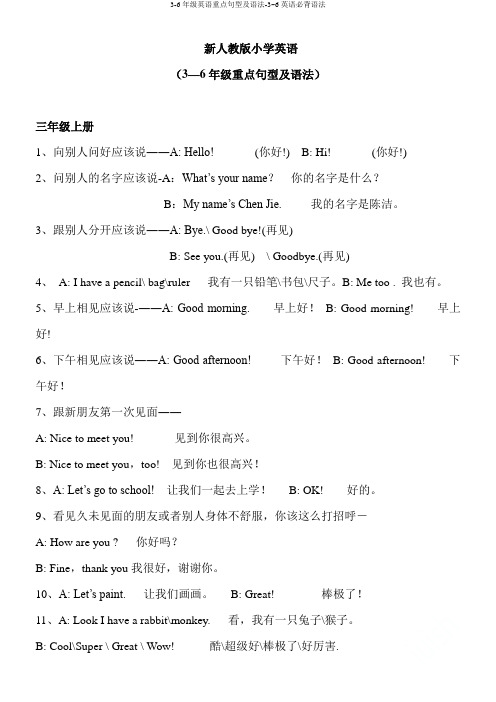
新人教版小学英语(3—6年级重点句型及语法)三年级上册1、向别人问好应该说――A: Hello! (你好!) B: Hi! (你好!)2、问别人的名字应该说-A:What’s your name?你的名字是什么?B:My name’s Chen Jie. 我的名字是陈洁。
3、跟别人分开应该说――A: Bye.\ Good bye!(再见)B: See you.(再见) \ Goodbye.(再见)4、A: I have a pencil\ bag\ruler 我有一只铅笔\书包\尺子。
B: Me too . 我也有。
5、早上相见应该说-――A: Good morning. 早上好!B: Good morning! 早上好!6、下午相见应该说――A: Good afternoon! 下午好!B: Good afternoon! 下午好!7、跟新朋友第一次见面――A: Nice to meet you! 见到你很高兴。
B: Nice to meet you,too! 见到你也很高兴!8、A: Let’s go to school! 让我们一起去上学!B: OK! 好的。
9、看见久未见面的朋友或者别人身体不舒服,你该这么打招呼-A: How are you ? 你好吗?B: Fine,thank you我很好,谢谢你。
10、A: Let’s paint. 让我们画画。
B: Great! 棒极了!11、A: Look I have a rabbit\monkey. 看,我有一只兔子\猴子。
B: Cool\Super \ Great \ Wow! 酷\超级好\棒极了\好厉害.12、你想看下别人的东西,你该这么说――A: May I have a look? 我可以看一看吗?B: Sure. Here you are! 当然可以。
给你!13、请别人吃东西,你该这么说――A: Have some French fries. 吃一些炸薯条。
小学三年级英语上册知识点大总结
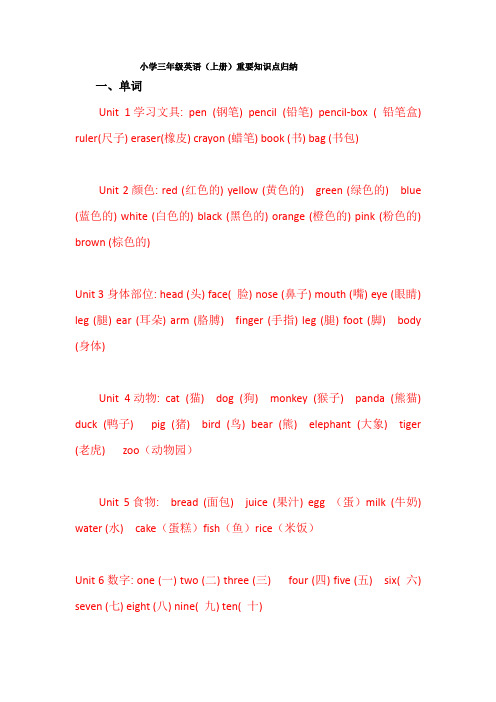
小学三年级英语(上册)重要知识点归纳一、单词Unit 1学习文具: pen (钢笔) pencil (铅笔) pencil-box ( 铅笔盒) ruler(尺子) eraser(橡皮) crayon (蜡笔) book (书) bag (书包)Unit 2颜色: red (红色的) yellow (黄色的)green (绿色的)blue (蓝色的) white (白色的) black (黑色的) orange (橙色的) pink (粉色的) brown (棕色的)Unit 3身体部位: head (头) face( 脸) nose (鼻子) mouth (嘴) eye (眼睛) leg (腿) ear (耳朵) arm (胳膊)finger (手指) leg (腿) foot (脚)body (身体)Unit 4动物: cat (猫)dog (狗)monkey (猴子)panda (熊猫) duck (鸭子)pig (猪)bird (鸟) bear (熊)elephant (大象)tiger (老虎) zoo(动物园)Unit 5食物: bread (面包)juice (果汁) egg (蛋)milk (牛奶) water (水)cake(蛋糕)fish(鱼)rice(米饭)Unit 6数字: one (一) two (二) three (三)four (四) five (五)six( 六) seven (七) eight (八) nine( 九) ten( 十)二. 牢记下面的对话, 会让你的英语说得更棒!(A是上句, B是答句)Unit 11.向别人问好应该说――A: Hello! (你好!) B: Hi! (你好!)2.问别人的名字应该说――A: What’s your name?你叫什么名字?. B:’.Che.Jie...我的名字是陈洁。
3.跟别人分手应A: Bye.\ Good bye!(再见) B: See you.(再见) \ Goodbye.(再见)4..A..hav..ruler\a.erase..我有一把尺..一块橡皮。
苏教译林版小学英语3-6年级知识点总结

苏教译林版小学英语3-6年级知识点总结1."What color is your cap?" "What time is it?" "What about a cake?" are all examples of ns that use "what" to inquire about something.2."What a nice cake it is!" is an example of using "what" with an adjective and a noun to describe something。
"How nice the cake is!" is another example。
using "how" instead of "what."3."It's time for lunch" and "It's time to get up" are both examples of using "it" to indicate a specific time or n.4."I like dogs" XXX"Do you like dogs?" XXX.5."I have a mango" emphasizes ownership of a specific item。
"I have some bananas" is another example。
"Do you have any bananas?" XXX "do" XXX.6."Some" and "any" can both be used with XXX。
苏教译林版小学英语3-6年级知识点总结
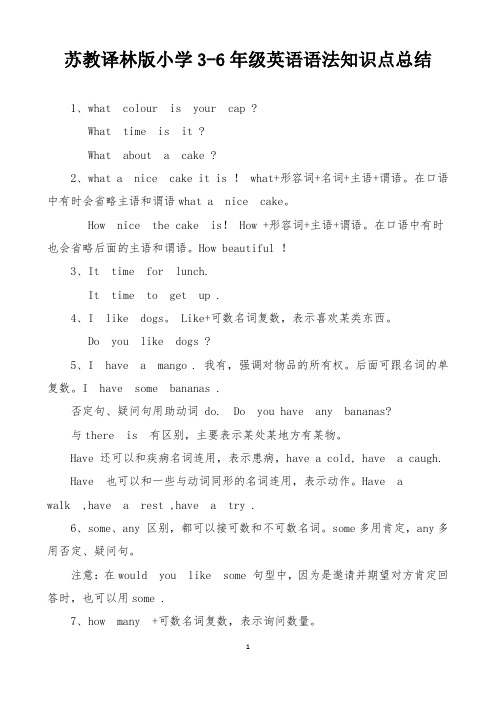
苏教译林版小学3-6年级英语语法知识点总结1、what colour is your cap ?What time is it ?What about a cake ?2、what a nice cake it is ! what+形容词+名词+主语+谓语。
在口语中有时会省略主语和谓语what a nice cake。
How nice the cake is! How +形容词+主语+谓语。
在口语中有时也会省略后面的主语和谓语。
How beautiful !3、It time for lunch.It time to get up .4、I like dogs。
Like+可数名词复数,表示喜欢某类东西。
Do you like dogs ?5、I have a mango . 我有,强调对物品的所有权。
后面可跟名词的单复数。
I have some bananas .否定句、疑问句用助动词 do. Do you have any bananas?与there is 有区别,主要表示某处某地方有某物。
Have 还可以和疾病名词连用,表示患病,have a cold, have a caugh.Have 也可以和一些与动词同形的名词连用,表示动作。
Have awalk ,have a rest ,have a try .6、some、any 区别,都可以接可数和不可数名词。
some多用肯定,any多用否定、疑问句。
注意:在would you like some 句型中,因为是邀请并期望对方肯定回答时,也可以用some .7、how many +可数名词复数,表示询问数量。
8、 What would you like ?或 would you like ……?表示礼貌征求别人意见或建议。
What would you like for breakfast?Would you like some apple juice ?(juice不可数,所以用some )9、how much is it ? 意思是多少钱?如果物品是复数,how much are they10、what subject do you like ?What lessons do you have today ?11、when do you go to school ?对时间提问。
小学三年级到六年级英语单词

第一册Modle 1 I 我、am (I’m=I am) 是(我是)、hello(hi)你好、goodbye再见、How are you? 你好吗?你好!、good 好的、morning 早晨,上午fine 健康的、thank 谢谢、you 你、are 是Modle 2Ms 女士、boy 男孩、girl 女孩and 那么、too 也、what 什么、is(what’s=what is) 是(是什么)、your 你的、name 名字please 请、afternoon 下午、Mr 先生Modle 3 point 指、to 向…. 、the 这(那)个,这(那)些、door 门、sit 坐、down 向下、stand 站、up 向上、window窗户blackboard 黑板、bird 鸟、desk 书桌、chair 椅子Modle 4 it 它、it’s=it is 红色的、look 看、wow 呀,哇、yellow黄色的、blue 蓝色的、a(an) 一个,一、chameleon 变色、my 我的panda 熊猫、now 现在、green 绿色、black 黑色的dog 狗、cat 猫、cap 帽子Modle 5How many多少、one 一、two 二、three三、four 四、five五、six 六、seven 七、eight 八、nine 九、ten 十、eleven 十一、twelve 十二Modle 6 、Happy 快乐的、birthday 生日、here(here’s=here is)这里(这是)、present 礼物、this 这个、pencil 铅笔、pen 钢笔、cake 蛋糕、old ….岁的how old 多大、yes 是的、you’re=you are 你是Modle 7teacher 老师、pupil 小学生、school 学校、classroom 教室、English 英语、that 那个、say 说、again 再一次、schoolbag 书包、ball 球、book 书Modle 8monster 怪物、new 新的、kite 风筝、or 或者、don’t=do not 不kown 知道、no 不、not(isn’t=is not) 不(不是)help 救命where(where’s=where is)哪里(在哪里)in 在….里面、bag 包Modle 9mother 母亲、father 父亲、sister 姐妹、brother 兄弟、she (she’s=she is) 她(她是)、grandma 祖母,外祖母、grandpa 祖父,外祖父、that’s= that is 那是、me 我、he(he’s=he is) 他(他是)、doctor 医生、policeman 警察、nurse 护士、driver 司机、farmer 农民Modle 10his 他的、head 头、leg 腿、foot 脚、on 在…之上、arm 胳膊、hand 手、her 她的、nose 鼻子、eye 眼睛、mouth 嘴、ear 耳朵第二册Modle 1 song 歌曲、TV电视台、favourite最喜欢的、colour 颜色、here you are给你Modle 2they 他(她/它)们、they’re=they are 他(她/它)们是、monkey 猴子baby 幼兽all 每个,全体、zoo 动物园、tiger 老虎、lion 狮子、elephant 大象、fat 胖的、man 人,男人、short 矮的、tall 高的、small 小的、thin 瘦的、big 大的Modle 3like喜欢、football足球、them 他(她/它)们、ouch 哎哟、basketball篮球、table tennis乒乓球、morning exercises早操、ride 骑、bike 自行车、swim 游泳、skip 跳绳Modle 4 meat 肉、pass 传递、rice米饭、mum妈妈、noodles面条、fish鱼肉,鱼、but但是、milk牛奶、dose do的第三人称单数形式、orange橙、柑、apple苹果、banana香蕉、pear梨、doesn’t=dose not 不Modle 5 go to school上学、Monday星期一、play参加(体育活动、比赛等)Phone 电话、on the phone通电话、friend 朋友、at 在….、home家、at home 在家、who谁、only只,仅仅、year年龄,岁数、work工作地点、go to work 上班、Saturday星期六、shopping购物、go shopping去购物、Modle 6 Sunday星期日、go swimmig去游泳、eat吃、sleep睡觉、watch观看、watch TV看电视、have 做,进行,从事、class 课,班级、today今天、music 音乐、has(have的第三人称单数形式)做,进行,从事、Chinese语文,汉语、maths数学、art美术、PE体育、science科学Modle 7 we 我们、fly放(风筝)、spring春天、season季节、nice迷人的,令人愉快的、warm暖喝的、hot热的、autumn秋天、cool凉爽的、winter冬天、cold寒冷的、skating滑冰、go skating去滑冰、play玩,玩耍、snow雪,下雪、sunny晴朗的、阳光充足的、windy有风的,刮风的、very很,非常Modle 8 toy玩具、under在…下面、for为,给,对、box盒子、behind在…后面、bedroom卧室、park公园、lake湖、tree树、fishing捕鱼,钓鱼、go fishing 去钓鱼、walk行走Modle 9 have got 有、sweater毛线衣、bed床、line线,绳,金属丝、about 关于、animal动物,sport运动、haven’t(got)=have not (got)没有、dress连衣裙、coat外套、T-shirt T恤衫、by乘(交通工具)、bus公共汽车、car汽车,轿车Modle 10 hat帽子、come来,来到、back回到,返回、come back回来、clothes 衣服、open打开、let’s=let us 让我们、put on穿上,戴上、funny滑稽的、party 聚会、OK好的、brown褐色的,棕色的、orange橙色的,橘黄色的、shirt衬衫、look at看,朝….看、shoe鞋子、can’t=can not不能、turn(多人一次轮流时)轮到的机会、white白色的、photo照片、skirt女裙,裙子第三册Modle 1one 一个物品、purpul紫色的、pink粉色的、white白色的、orange橙色的、point分、winner冠军、thirteen十三、fourteen十四、fifteen十五、sixteen十六、seventeen十七、eighteen十八、nineteen十九、twenty二十Modle 2 go straight on直着走、excuse me对不起,打扰、road道路,街道、turn left向左转、turn right向右转、next to临近的,在….旁边、supermarket 超市、station车站、train火车、up向上、hill小山、down向下、near接近,临近、house房屋Modle 3 write书写、letter信件、picture图画、friend朋友、take pictures照相、talk to和….交谈、little小的,年幼的、play with玩,摆弄、listen to听、read阅读Modle 4let’s让我们、get on上(车)、lots of许多、interesting有趣的、thing物品,东西、look at看、people人,人们、park公园、lake湖、row划(船)、boat船、men男人(复数),人(复数)、chess象棋、drink喝,饮用、hungery 饥饿的Modle 5Chinese中国的、fast food快餐、want需要,想要、some一些、make制作、nice美味的、chopsticks筷子、difficult困难的、cook烹饪、vegetable 蔬菜、love喜爱Modle 6can能够、run跑、fast快、jump跳、high高、far远、ride骑,乘、flute笛子、wash洗,清洗、clothes衣服、draw画Modle 7children孩子(复数)、tomorrow明天、by plane乘坐飞机、get up起床、China中国、swim游泳、sea大海、visit拜访、stone石头、animal动物Modle 8 Sports Day运动日、for为了…..,给…..、meter米、every day每天、good luck好运气、come on 快点,赶快、high jump调高、long jump跳远Modle 9soup汤、sorry抱歉,对不起、sweets糖果(复数)、bread面包、turn on打开、light灯、biscuit饼干、fruit水果、today今天、come in请进、of course 当然Modle 10count数数、january 1月、February 2月、March 3月、April 4月、May 5月、June 6月、July 7月、August 8月、September 9月、October 10月、November 11月、December 12月、party 聚会Modle 1nice好的,友善的、a bit有一点、shy害羞的、clever聪明的、naughty淘气的、cool酷的、little小的,年幼的、cute可爱的Modle 2capital首都、about关于、beautiful美丽的、long长的、wide宽的、many很多的、river河流、old古老的、famous著名的Modle 3take带走,拿走、picnic野餐、great太汗了、ball球、why为什么、because因为、so所以、homework家庭作业、help帮助、Monday星期一、Tuesday 星期二、Wednesday星期三、Thursday星期四、Friday星期五、Saturday星期六、Sunday星期日Modle 4robot机器人、everything所有事情、one day有一天、housework家务、learn学习、our我们的、weather天气Modle 5than比….、old年长的、young年轻的、strong强壮的、the Great Wall 长城、the Summer Palace颐和园Modle 6voice声音、think认为、better更好的、first第一个、agree同样、worse较差的、quiet安静的、bad差的、pop music流行音乐Modle 7country国家、east东,东边、project综合实践活动、also也、call称作、speak说、right正确的、city城市、west西,西边、there那里、north 北,北边、south南,南边Modle 8who谁、grandparent(外)祖父(母)、then在那时、me我(宾格)、hair头发、so如此的,多么的Modle 9phone打电话、yesterday昨天、day一天、him他(宾格)、laugh 笑、dance跳舞、stop停止、last刚过去的,最近的Modle 10happen发生、ride骑,乘、then然后、thirsty口渴的、watermelon西瓜、carry携带,运送、bump磕,碰、stomachache胃疼、cold感冒、headache 头疼、fever发烧、fell off跌落、went (go的过去式)去….、bought(buy的过去式)购买、had(have的过去式)吃,患(病)Modle 1when什么时候、back回来,回到、home回家,到家、those那些、ice cream冰淇淋、with和…在一起、finish吃完、hurry赶紧,匆忙、hurry up 快点、wait等待、drop落下,掉下、dear亲爱的、met(meet的过去式)遇见、ran(run的过去式)跑Modle 2need需要、food食物、shopping list购物单、cheese奶酪、how much 多少、kilo千克,公斤、juice果汁、box盒、bottle瓶Modle 3the British Museum大英博物馆、wheel轮、wonderful令人惊奇的、understand明白,理解、postcard明信片、hour小时、mountain山Modle 4 mine我的、yours你(们)的、argue争吵、matter麻烦事,困难、wear穿、hers她的、his他的、line绳子、clean干净的、whose谁的Modle 5 enough足够的、give给、every每个,每一、everyone每人,人人、them它(他,她)们careful小心的Modle 6 well好地、team队,组、cntrol控制、badly不好地、really真正地、catch接住,抓住、fantastic极好的,极出色的Modle 7programme节目、useful有用的、blind盲的,失明的、deaf聋的、hear听到、firemen消防员(复数)、mum妈妈、sausage香肠、sit坐、sit down 坐下、chick小鸟Modle 8exercise体操,运动、playground操场、before在….前、skip跳(绳)、coffee咖啡、tea茶、bell铃、rang(ring的过去式)鸣,响Modle 9feel感觉的、sad难过的、miss想念、bored无聊的、angry生气的、nothing没什么、secret秘密、tell高诉、surprise使人意外的,意外、tired疲倦的,劳累的、grandfather祖父,外祖父、farm农场、game比赛、lost(lose的过去式)丢失、smell闻到Modle 10should应该、cross穿过、dangerous危险的、hold抓住,握住、hand 手、say说话,讲话、in a hurry匆忙Modle 1 life生活、different不同的、ago以前、any任何,一些、television电视机、grandchildren(外)孙子(女)(复数)、us我们(宾格)、grandmother 祖母,外祖母、lady女士,夫人、fire炉火、radio收音机、telephone电话、field 田地、hope希望Modle 2 learnt(lean的过去式)学习、these这些、dancer舞蹈演员、class 班级、hard努力的、retired退休的Modle 3 egg鸡蛋、email电子邮件、sandwich三明治、traditional传统的、delicious美味的,可口的、hamburger汉堡、ate(eat的过去式)吃、gave Modle 4 library图书馆,find找到,CD-ROM电脑光盘,bring带来、拿来,use使用,card卡片,easy简单的,information信息,timetable时间表、时刻表,dictionary字典,newspaper报纸Modle 5 light轻的,broken坏的、破的,heavy重的,pocket口袋,兜儿,hard 困难的Modle 6 photo照片,stay停留,week星期、周,parent父亲、母亲,rode(ride 的过去式)骑(马),horse马,climb攀登、爬,holiday假日Modle 7 message信息,another另一个,idea主意、想法,office办公室,busy 忙碌的Modle 8 suggest建议,quickly快的,迅速的、excited激动的、兴奋的,Americ 美国,Chinese中国人,kind种类,dragon龙,same相同的,circle圆、圆圈Modle 9 wore(wear的过去式) 穿,women女人(复数),actor(男)演员,told(tell 的过去式)讲、告诉,joke笑话,funny滑稽的,after在…..以后,show演出,ready准备好的,soon不久,bed床,room房间,history历史,question问题,borrow借来,evening傍晚Modle 10 list目录、清单,airport机场,shoe鞋,ticket票,toothbrush牙刷,arrive到达,taxi出租车,flat公寓,building建筑物,made(make的过去式)做,again再一次Modle 1 postcard明信片,more更多,thousand一千、一千个,kilometer公里,million百万、百万个,Mexico墨西哥,Canada加拿大Modle 2miss思念,sometimes有时,restaurant饭馆,really真的,dancing 舞蹈,square广场Modle 3 collect收集,stamp邮票,hobby业余爱好、嗜好,men男人(复数),women女人(复数),another另一个Modle 4 festival节日,special特殊的、特别的,meal一餐、一顿饭,sound听起来,lantern灯笼,race比赛,moon月饼Modle 5 pleased高兴的、满足的,meet见到、遇到,address地址,pen friend 笔友,Australia澳大利亚,French法语,pet宠物Modle 6 someday(将来)有一天,chopsticks筷子(复数),soon不久、很快,knife餐刀、小刀,fork叉子Modle 7 believe相信、lucky幸运的,bamboo竹子,CD-ROM只读光盘,copy 模仿,fantastic非常、好的、棒的Modle 8 often常常、经常,clean清理,always总是,never从不Modle 9 building建筑物、大楼,all around到处、处处,peace和平,inside 在….内,show展示、展出Modle 10hurry赶紧、赶快,rule规定、规则,library card借书卡,line排、列,in line成一条直线,CD激光唱盘。
三至六年级英语知识点归纳
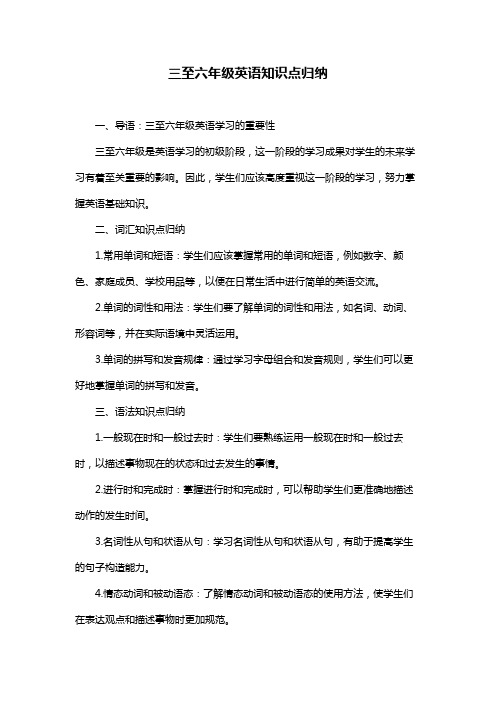
三至六年级英语知识点归纳一、导语:三至六年级英语学习的重要性三至六年级是英语学习的初级阶段,这一阶段的学习成果对学生的未来学习有着至关重要的影响。
因此,学生们应该高度重视这一阶段的学习,努力掌握英语基础知识。
二、词汇知识点归纳1.常用单词和短语:学生们应该掌握常用的单词和短语,例如数字、颜色、家庭成员、学校用品等,以便在日常生活中进行简单的英语交流。
2.单词的词性和用法:学生们要了解单词的词性和用法,如名词、动词、形容词等,并在实际语境中灵活运用。
3.单词的拼写和发音规律:通过学习字母组合和发音规则,学生们可以更好地掌握单词的拼写和发音。
三、语法知识点归纳1.一般现在时和一般过去时:学生们要熟练运用一般现在时和一般过去时,以描述事物现在的状态和过去发生的事情。
2.进行时和完成时:掌握进行时和完成时,可以帮助学生们更准确地描述动作的发生时间。
3.名词性从句和状语从句:学习名词性从句和状语从句,有助于提高学生的句子构造能力。
4.情态动词和被动语态:了解情态动词和被动语态的使用方法,使学生们在表达观点和描述事物时更加规范。
四、阅读和写作技巧1.阅读理解策略:学生们要学会运用阅读理解策略,如预测、扫描、细读等,提高阅读效果。
2.写作结构和方法:掌握写作的基本结构和方法,如开头、正文、结尾等,使文章条理清晰。
3.提高阅读和写作水平的建议:多读、多写、多练,积累词汇和语法知识,不断提高阅读和写作水平。
五、口语交际知识点归纳1.日常问候和礼貌用语:学生们要熟练掌握日常问候和礼貌用语,如Hello、Good morning、Thank you等。
2.描述人和事物的方法:学会用英语描述人和事物,如外貌、性格、喜好等。
3.表达喜好和意见的方式:学生们要学会用英语表达自己的喜好和意见,如I like、I don"t like等。
六、学习方法和习惯1.制定学习计划和目标:学生们要制定合理的学习计划和目标,有针对性地进行学习。
3-6年级上册英语重点知识点

3-6年级上册英语重点知识点
以下就是小编给大家整理的有关三至六年级英语上册的重点知识点,仅供大家参。
三年级上册:
-26个英文字母的大小写和发音
-基本的问候语、打招呼和道别语
-数字1-20的认读和书写
-简单的颜色、水果、动物等词汇
-人称代词(I,you,he,she,it)的理解和使用
四年级上册:
-更多的教室用品、家庭成员、身体部位等词汇
-一般现在时的肯定句、否定句和疑问句-时间、日期和天气的表达
-介词(in,on,under)的用法
-可数和不可数名词的区分
五年级上册:
-日常生活中的动作和活动词汇
-现在进行时的构成和用法
-一般过去时的简单理解和运用
-比较级和最高级的初步认识
-问路和指路的表达方式
六年级上册:
-各种话题的阅读理解,如故事、邮件、通知等-一般将来时的用法
-过去进行时的理解和运用
-复合句的使用,如定语从句、状语从句
-写作技巧,包括记叙文、说明文等
这些只是一些重点知识点的概述,每个教材的具体内容和重点可能会有所不同。
此外,英语学习还包括听力、口语、阅读和写作等方面的综合能力提升。
湘少版小学英语3-6年级复习要点

湘少版小学英语3-6年级要点三年级上册U nit 1 Hello!〔你好!〕Unit 2 Good morning〔上午好!〕Unit 3 问:What’s your name?〔你的名字是什么?〕答:My name is Peter/Anne.<我的名字是Peter/Anne.> Unit 4 问:How old are you?〔你几岁了?〕答:I’m nine.<我九岁.>Unit 5 This is my family.〔这是我的家〕Unit 6 问:What’s he?〔他是谁?〕答:He is my grandfather.〔他是我爷爷.〕Unit 7 It’s a dog.〔它是一只狗.〕Unit 8 问:What’s this?〔这是什么?〕答:It’s a pencil-box.<它是一个文具盒.>问:What’s that?〔那是什么?〕答:It’s a pen.〔它是一支钢笔.〕Unit 9 It’s a mouth.〔它是一X嘴.〕Unit 10 Touch your head.〔摸你的头〕Unit 11 I like the bird.〔我喜欢那只鸟.〕Unit 12 Happy birthday!〔生日快乐!〕三年级下册Unit 1 问:How are you?〔你好吗?〕答:I’m fine ,thank you.〔我好,谢谢你.〕Unit 2 问:Are you Lingling?〔你是玲玲吗?〕答:Yes,I am./No, I’m not.<是的,我是/不是的,我不是.>Unit 3 问:What color is this balloon?〔这个气球是什么颜色?〕答:It’s blue/pink.<它是蓝色/粉色.>Unit 4 Look at the T-shirts.〔看这件T恤衫.〕Unit 5 问:What time is it?〔几点钟了?〕答:It’s seven o’clock. /Sorry, I don’t know.<7点/对不起,我不知道.> Unit 6 问:How many pens are there?〔有几只钢笔?〕答:Four pens.<四只钢笔.>Unit 7 问:Is this an orange?.〔这是一个橘子吗?〕答:Yes,it is./No,it isn’t.<是的,它是./不是的,它不是.>Unit 8 I like a sunny day.〔我喜欢晴天〕Unit 9 问:What’s the weather like?〔天气怎样?〕答:It’s raining.<在下雨.>Unit 10 问:Is he a farmer?〔他是一个农民吗?〕答:Yes, h e is /No, he isn’t.<是的,他是./不是的,他不是.>Unit 11 问:What’s he?〔他是干什么的?〕答:He is a postman/teacher/policeman/farmer/pupil/fireman.〔他是邮递员/教师/警察/农民/小学生/消防员〕Unit 12 问:How do you go to school? 你怎样来学校?答: I e to school by bus.〔我坐公交车来学校.〕四年级上册Unit 1 Nice to meet you.〔见到你很高兴!〕Unit 2 It’s a circle.〔它是一个圆.〕Unit 3 Look at this elephant.〔看这只象.〕Unit 4 These are flowers.〔这些是花.〕Unit 5 I like noodles.〔我喜欢面条.〕Unit 6 Turn right.〔向右转.〕Unit 7 问:Whose is this?〔这是谁的?〕答:It’s my wallet.〔它是我的钱包.〕Unit 8 She wears a white and black sweater.〔她穿白黑相间的毛衣.〕Unit 9 It’s one hundred.〔它是一百〕Unit 10 Wele to our home.〔欢迎来我们的家〕Unit 11 问:Where’s the cat?〔猫在哪里?〕答:She’s in the kitchen.〔她在厨房.〕Unit 12 Peter can jump high.〔Peter 能跳高.〕四年级下册Unit 1 问:Where is my cap? 我的帽子在哪里?答:It’s on your head!〔它在你的头上.〕Unit 2 Spring is warm.〔春天暖和.〕Unit 3 问:What can you see?〔你能看见什么?〕答:I can see a river/a lake/a boat/the blue sky/white clouds/.〔我能看见一条小河/一个湖/蓝色天空/白云.〕Unit 4 问:Can you write in English?〔你能用英语写吗?〕答:Yes, I can./ No, I can’t.〔是的,我能./ 不是的,我不能.〕Unit 5 Peter is writing.〔Peter 在写字.〕Unit 6 问:What’s Anne doing?〔Anne 在做什么?〕答:She is skipping.〔她在跳绳.〕Unit 7 问:What day is today? 今天星期几?答:Today is Saturday.〔今天是星期六.〕Unit 8 问:Where are you from?〔你从哪里来?你是哪里人?〕答:I e from China.〔我来自中国. 我是中国人.〕Unit 9 问:How much is it?〔它多少钱?〕答:It’s fifty-six yuan.〔它是56元.〕Unit 10 He has two feet.〔他有两只脚.〕Unit 11 问:Do you have a ticket?〔你有票吗?〕答:Yes,I do./No, I don’t.〔是的,我有./不,我没有.〕Unit 12 问:Do you have any money?〔你有钱吗?〕答:Yes, I have two yuan.〔是的,我有两元.〕五年级上册Unit 1 问:What does she look like?〔她看起来怎样?〕答:She has short hair and small eyes. She is beautiful.〔她有短发和小眼睛,她很漂亮.〕Unit 2 问:What would you like ?〔你想要什么?〕答:I’d like a hamburger.〔我想要汉堡包.〕Unit 3 问:Do you want some rice?〔你想要吃米饭吗?〕答:Yes, please./No,thank you.〔是的,请来一些.〕〔不,谢谢你.〕Unit 4 问:Can I use your pencil, please?〔请问我能用你的铅笔吗?〕答:Yes, here you are.〔可以,给你.〕Unit 5 问:Can I have a pet?〔我可以养宠物吗?〕答:Yes, you can./No, you can’t.〔是的,你可以.〕〔不,你不能.〕Unit 6 问:Which one do you want?〔你想要哪一个?〕答:I want the thick one.〔我想要厚的这一件.〕Unit 7 问:What time do you get up?〔你几点起床?〕答:I get up at 6:50.〔我六点五十起床.〕Unit 8 Lingling helps her parents.〔玲玲帮助她的父母.〕Unit 9 问:What’s your hobby?〔你的业余爱好是什么?〕答:My hobby is reading.〔我的爱好是读书.〕Unit 10 问:What does that sign mean?〔这个标志是什么意思?〕答:It means "You can go out from there .〞〔它的意思是"你可以从那儿出去.〞〕Unit 11 I’m sorry./I feel sorry. 〔对不起/我觉得不好意思.〕Unit 12 The Spring Festival.〔春节〕Children wear new clothes.〔孩子们穿新衣服.〕五年级下册Unit 1 We are going to read stories.〔我将要读故事.〕Unit 2 We are going to do some research.〔我们将要做一些调查.〕Unit 3 Let’s make a kite.〔让我们做风筝吧.〕Unit 4 Don’t talk here.〔不要在这里讲话.〕Unit 5 问:W hen’s your birthday?〔你的生日是什么时候?〕答:My birthday is in March./It’s on the fifth of March.〔我的生日在三月.〕〔我的生日在3月5日.〕Unit 6 I’ll make a beautiful card.〔我将要做一X漂亮的卡片.〕Unit 7 问:Is there a post office near my school?〔我的学校附近有一个邮局吗?〕答:Yes ,there is./No,there isn’t.〔是的,有./不,没有.〕Unit 8 问:Can you show me the way to the Xinhua hotel?〔你能告诉我到新华旅社的路吗?〕答:Y ou can go straight along this road.〔你可以沿着这条路直走.〕Unit 9 He’s kind to children.〔他对孩子们好.〕Unit 10 问:Where were you yesterday?〔昨天你在哪里?〕答:I was at work.〔我在工作.〕Unit 11 问:Who was first?〔谁第一?〕答:Amy was first.〔艾米第一.〕Unit 12 问:Where did you go?〔你们去过哪里?〕答:We went to the park.〔我们去过公园.〕六年级上册Unit 1 问:What did you do during the holidays?〔假日你做了什么?〕答:I read many books/We watched TV.〔我读了书/我们了看电视.〕Unit 2 Katie always gets up early.〔Katie总是起床早.〕Unit 3 问:What do you like ? 你喜欢什么?答:I like my puter.〔我喜欢电脑.〕Unit 4 The Mid-Autumn Festivals is ing.〔中秋节要来了.〕Unit 5 It will be sunny and cool tomorrow.〔明天天气将晴朗又凉爽.〕Unit 6 问:What will you bring for the piic?野炊你将带什么?答:I will bring a big bottle of orange juice.〔我将带一大瓶橘子汁.〕Unit 7 问:What can you do?〔你能做什么?〕答:I can ask Mun to make cakes for them. 我可以要妈妈给他们做蛋糕. Unit 8 We shouldn’t waste water.〔我们不应该浪费水.〕Unit 9 This bird is bigger than the first one.〔这只鸟比第一只鸟大些.〕Unit 10 问:What’s wrong with you? 你怎么啦?答:I have a fever. 我发烧问:What’s wrong with you today? 你今天怎么啦?答:I don’t feel well today.〔今天我觉得不舒服.〕Unit 11 问:Shall we go to the theatre?〔我们将去剧院吗?〕答:Well,it’s a good idea.〔好,这是一个好主意.〕Unit 12 It’s Christmas again!〔圣诞节又到了!〕六年级下册Unit 1 A family outing.〔家庭旅游.〕Unit 2 Some stories are more interesting.〔有些故事更有趣.〕Unit 3 We should learn to take care of ourselves.〔我们应该学会照顾好自己.〕Unit 4 Planting trees is good for us.〔植树对我们有好处.〕Unit 5 Our Earth looks like this in space.〔我们的地球在太空中象这个样子.〕Unit 6 Anne wanted to dance.〔Anne想要跳舞.〕Unit 7 I’m not afraid.〔我不害怕.〕Unit 8 International Children’s Day.〔国际六一儿童节.〕Unit 9 Look at these beautiful places in the world.〔看世界上这些漂亮的地方.〕。
2023年精通版小学英语3-6年级下册各单元知识点归纳汇总

精通版小学英语3-6年级下册各单元知识点归纳汇总三年级下册Unit Let’s go to school.一、核心词汇school 学校classroom 教室textbook 课本storybook 故事书Chinese book 语文书English book 英语书exercise book 练习本notebook 笔记本desk 课桌chair 椅子二、了解词汇nice 令人愉快的see 看见again 又,此外,再一次glad高兴的guess猜look 看new 新的三、核心句型1. Let’s go to school. 咱们去上学吧。
解读:这是表示提出建议的句子。
举一反三: Let’s go to the classroom. 咱们去教室吧。
Let’s have a talk. 咱们谈一谈吧。
2. I have a new textbook. 我有一本新课本。
解读:这是一个表示我有某物的句型。
举一反三: I have a new storybook. 我有一本新故事书。
I have an old English book. 我有一本旧英语书。
3. What’s in my bag? 我的书包里面有什么?解读:这是一个询问某物里面有什么的句型。
举一反三: —What’s in your hand?你的手里有什么?— A Chinese book and an English book. 一本语文书和一本英语书。
—What’s in my pencil-box? 我的铅笔盒里面有什么?—Some pencils. 一些铅笔。
4. What’s on the chair? 椅子上面有什么?解读:这是一个询问某物上面有什么的句型。
举一反三: What’s on the bed?床上面有什么?What’s on my desk?我的课桌上面有什么?四、了解句型1. Nice to see you again. 很高兴再次见到你。
小学三至六年级英语知识点归纳总结
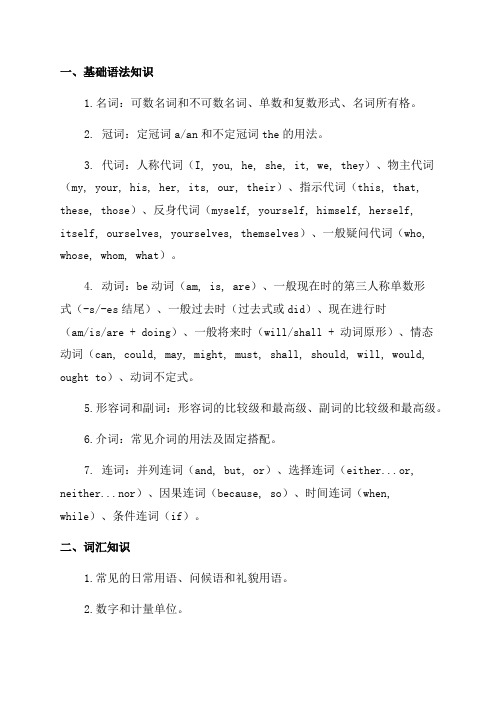
一、基础语法知识1.名词:可数名词和不可数名词、单数和复数形式、名词所有格。
2. 冠词:定冠词a/an和不定冠词the的用法。
3. 代词:人称代词(I, you, he, she, it, we, they)、物主代词(my, your, his, her, its, our, their)、指示代词(this, that, these, those)、反身代词(myself, yourself, himself, herself, itself, ourselves, yourselves, themselves)、一般疑问代词(who, whose, whom, what)。
4. 动词:be动词(am, is, are)、一般现在时的第三人称单数形式(-s/-es结尾)、一般过去时(过去式或did)、现在进行时(am/is/are + doing)、一般将来时(will/shall + 动词原形)、情态动词(can, could, may, might, must, shall, should, will, would, ought to)、动词不定式。
5.形容词和副词:形容词的比较级和最高级、副词的比较级和最高级。
6.介词:常见介词的用法及固定搭配。
7. 连词:并列连词(and, but, or)、选择连词(either...or, neither...nor)、因果连词(because, so)、时间连词(when, while)、条件连词(if)。
二、词汇知识1.常见的日常用语、问候语和礼貌用语。
2.数字和计量单位。
3.季节、天气、时间和日期的词汇。
4.日常生活中的家庭、学校、城市、交通工具等的词汇。
5.常见的动物、植物、水果、蔬菜等的词汇。
6.颜色、形状、大小、方向等的词汇。
7.常见的体育项目、运动用品和运动动作的词汇。
三、阅读和写作技巧1.阅读理解:根据文章内容回答问题、判断正误、选择正确答案等。
冀教版小学3——6年级英语知识点梳理

冀教版小学3——6年级英语知识点梳理Grade 3Unit 1: Animals on the FarmWords: farm。
farmer。
pig。
cow。
sheep。
cat。
dog。
chicken。
duck。
fish。
bird。
horse。
rabbit。
in。
on。
underXXX:1.What is this。
It is a (an) ______。
(这是什么?这是……)2.Is it a ______。
Yes。
it is。
/ No。
it isn't。
It's a ______。
(这是…吗?是的,它是/不,它不是,它是……)can。
/ No。
I can't。
(你会跳舞/看/游泳/唱歌吗?是的,我会/不,我不会。
)4.XXX。
(什么动物会飞/跑/游泳?)5.Where is the ______。
XXX ______。
(在哪?它在……里面/上/下面。
)6.Can I help you。
Yes。
please。
(我能帮助你吗?是的。
)7.What happened。
(发生什么事了?)8.Can a horse run。
Yes。
it can。
/ No。
it can't。
(马会跑吗?是的,它会。
/不,它不会。
)9.What's in the box。
An animal。
(盒子里有什么?一只动物。
)Unit 2: Animals at the ZooWords: zoo。
panda。
XXX。
elephant。
big。
smallXXX:1.What is this。
It is a ______。
(这是什么?这是……)2.Is it big/small。
It is big/small。
(它大/小吗?它大/小。
)3.What animals are at the zoo。
(动物园里有什么动物?)4.Can a monkey climb。
Yes。
it can。
/ No。
三年级英语应该掌握哪些知识点
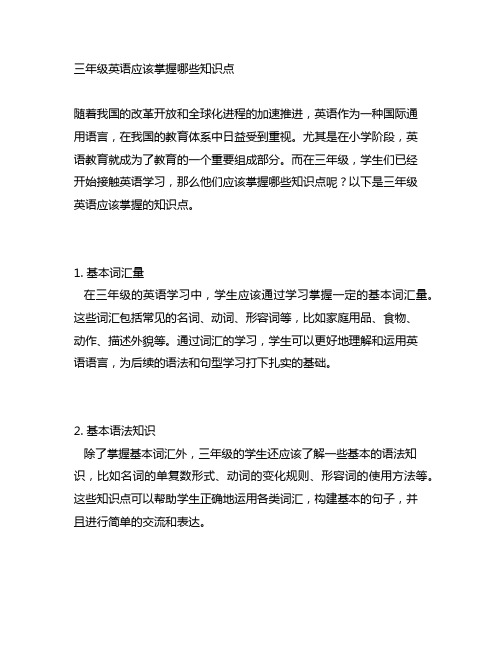
三年级英语应该掌握哪些知识点随着我国的改革开放和全球化进程的加速推进,英语作为一种国际通用语言,在我国的教育体系中日益受到重视。
尤其是在小学阶段,英语教育就成为了教育的一个重要组成部分。
而在三年级,学生们已经开始接触英语学习,那么他们应该掌握哪些知识点呢?以下是三年级英语应该掌握的知识点。
1. 基本词汇量在三年级的英语学习中,学生应该通过学习掌握一定的基本词汇量。
这些词汇包括常见的名词、动词、形容词等,比如家庭用品、食物、动作、描述外貌等。
通过词汇的学习,学生可以更好地理解和运用英语语言,为后续的语法和句型学习打下扎实的基础。
2. 基本语法知识除了掌握基本词汇外,三年级的学生还应该了解一些基本的语法知识,比如名词的单复数形式、动词的变化规则、形容词的使用方法等。
这些知识点可以帮助学生正确地运用各类词汇,构建基本的句子,并且进行简单的交流和表达。
3. 日常用语和交际技能三年级的学生在学习英语的过程中,应该掌握一些日常用语和基本的交际技能。
比如问候语、自我介绍、简单的交流对话等。
这些内容可以帮助学生在日常生活中与外国人进行简单的交流,增强他们的实际运用能力。
4. 基本句型和表达三年级学生还需要掌握一些基本句型和表达方式,比如肯定句、否定句、疑问句、指示句等。
这些句型和表达方式可以帮助学生更好地表达自己的意思,并且理解他人的表达。
也为学生未来更深入的语言学习奠定了基础。
5. 听力和阅读能力除了语言表达能力外,学生还应该有一定的听力和阅读能力。
在三年级,学生应该能够听懂一些简单的英语对话和文章,并且能够简单地进行阅读理解。
这可以帮助学生更好地理解英语语言,并且为日后更深入的阅读和听力训练打下基础。
在三年级的英语学习中,学生应该掌握一定的词汇量、基本语法知识、日常用语和交际技能、基本句型和表达以及听力和阅读能力。
这些知识点既能满足学生日常生活中的交流需求,又为他们未来更深入的英语学习奠定了基础。
在教学中,教师应该根据学生的实际情况和能力,设计合理的教学内容和方法,帮助学生更好地掌握这些知识点。
小学三至六年级英语知识点归纳总结
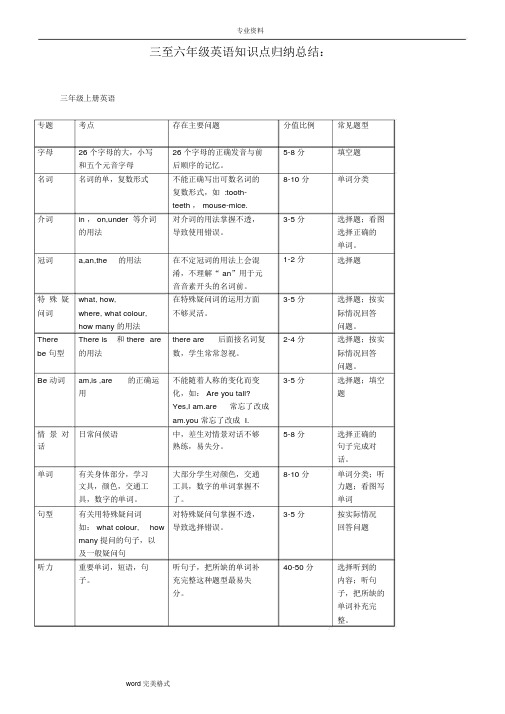
专业资料三至六年级英语知识点归纳总结:三年级上册英语专题考点存在主要问题分值比例常见题型字母26 个字母的大,小写26 个字母的正确发音与前5-8 分填空题和五个元音字母后顺序的记忆。
名词名词的单,复数形式不能正确写出可数名词的8-10 分单词分类复数形式,如 :tooth-teeth , mouse-mice.介词in , on,under 等介词对介词的用法掌握不透,3-5 分选择题;看图的用法导致使用错误。
选择正确的单词。
冠词a,an,the的用法在不定冠词的用法上会混1-2 分选择题淆,不理解“ an”用于元音音素开头的名词前。
特殊疑what, how,在特殊疑问词的运用方面3-5 分选择题;按实问词where, what colour,不够灵活。
际情况回答how many 的用法问题。
There There is和 there are there are后面接名词复2-4 分选择题;按实be 句型的用法数,学生常常忽视。
际情况回答问题。
Be 动词am,is ,are的正确运不能随着人称的变化而变3-5 分选择题;填空用化,如: Are you tall?题Yes,I am.are常忘了改成am.you 常忘了改成 I.情景对日常问候语中,差生对情景对话不够5-8 分选择正确的话熟练,易失分。
句子完成对话。
单词有关身体部分,学习大部分学生对颜色,交通8-10 分单词分类;听文具,颜色,交通工工具,数字的单词掌握不力题;看图写具,数字的单词。
了。
单词句型有关用特殊疑问词对特殊疑问句掌握不透,3-5 分按实际情况如: what colour,how导致选择错误。
回答问题many 提问的句子,以及一般疑问句听力重要单词,短语,句听句子,把所缺的单词补40-50 分选择听到的子。
充完整这种题型最易失内容;听句分。
子,把所缺的单词补充完整。
三年级下册英语有关家husband,wife,broth不理解家谱的关系,不能2-3 分选择题;填空庭成员er,sister,uncle,au写出正确的称呼。
小学英语三到六年级单词集锦(陕旅版)
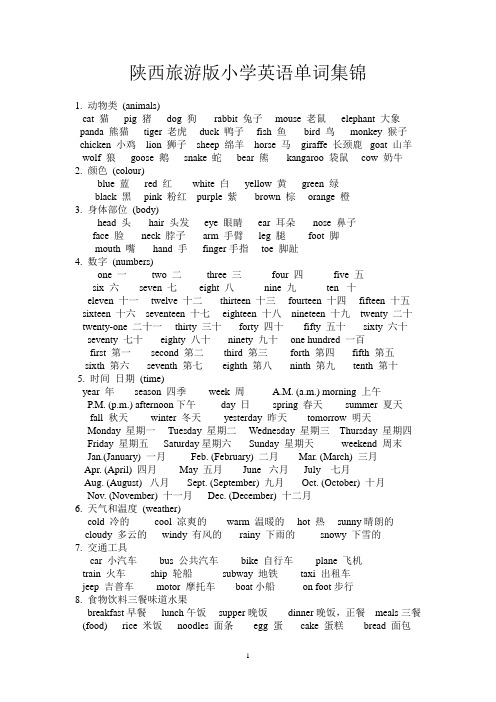
陕西旅游版小学英语单词集锦1. 动物类(animals)cat 猫pig 猪 dog 狗rabbit 兔子mouse 老鼠elephant 大象panda 熊猫tiger 老虎 duck 鸭子 fish 鱼bird 鸟 monkey 猴子chicken 小鸡lion 狮子 sheep 绵羊 horse 马 giraffe 长颈鹿 goat 山羊 wolf 狼 goose 鹅 snake 蛇 bear 熊kangaroo 袋鼠 cow 奶牛2. 颜色(colour)blue 蓝red 红white 白yellow 黄green 绿black 黑pink 粉红 purple 紫brown 棕orange 橙3. 身体部位(body)head 头hair 头发eye 眼睛ear 耳朵 nose 鼻子face 脸neck 脖子arm 手臂leg 腿foot 脚mouth 嘴hand 手finger手指toe 脚趾4. 数字(numbers)one 一 two 二three 三 four 四 five 五six 六 seven 七eight 八nine 九ten 十eleven 十一twelve 十二thirteen 十三 fourteen 十四 fifteen 十五 sixteen 十六 seventeen 十七eighteen 十八 nineteen 十九 twenty 二十twenty-one 二十一thirty 三十forty 四十fifty 五十sixty 六十seventy 七十 eighty 八十 ninety 九十one hundred 一百first 第一second 第二third 第三forth 第四fifth 第五sixth 第六seventh 第七eighth 第八 ninth 第九tenth 第十5. 时间日期(time)year 年season 四季week 周 A.M. (a.m.) morning 上午P.M. (p.m.) afternoon下午day 日 spring 春天summer 夏天fall 秋天 winter 冬天yesterday 昨天 tomorrow 明天Monday 星期一 Tuesday 星期二 Wednesday 星期三 Thursday 星期四Friday 星期五 Saturday星期六Sunday 星期天weekend 周末Jan.(January) 一月 Feb. (February) 二月 Mar. (March) 三月Apr. (April) 四月May 五月 June 六月 July 七月Aug. (August) 八月 Sept. (September) 九月 Oct. (October) 十月Nov. (November) 十一月Dec. (December) 十二月6. 天气和温度(weather)cold 冷的 cool 凉爽的warm 温暖的 hot 热sunny 晴朗的cloudy 多云的windy 有风的 rainy 下雨的snowy 下雪的7. 交通工具car 小汽车 bus 公共汽车bike 自行车 plane 飞机train 火车 ship 轮船subway 地铁 taxi 出租车jeep 吉普车 motor 摩托车 boat小船 on foot步行8. 食物饮料三餐味道水果breakfast早餐 lunch午饭 supper晚饭 dinner晚饭,正餐meals 三餐(food) rice 米饭 noodles 面条egg 蛋 cake 蛋糕 bread 面包tofu 豆腐hot dog热狗hamburger汉堡包noodles 面条soup 汤chicken 鸡肉 meat 肉 pork 猪肉 mutton 羊肉 eggplant 茄子beef 牛肉 vegetable 蔬菜 fish 鱼 potato 土豆 green beans 青豆tomato 西红柿(drink)coffee 咖啡 tea 茶 water 水juice 果汁 Coke 可乐ice-cream 冰激凌ice冰milk牛奶(fruit)orange 桔子apple 苹果pear 梨strawberry 草莓banana 香蕉grapes 葡萄lemon 柠檬peach 桃子 watermelon 西瓜9.职业(jobs)doctor 医生 driver 司机singer 歌手 farmer 农民nurse 护士teacher 教师 student学生 writer作家 actor 男演员 actress女演员cleaner 清洁工 engineer 工程师TV report 电视台记者artist 画家policeman 警察accountant 会计salesperson 销售员player 运动员10. 反义词big---small大的/小的 long ---short长的/短的tall--- short高的/矮的thin--- fat瘦的/胖的heavy---light重的/轻的happy--- sad高兴的/悲伤的 open---close打开/关上good--- bad好的/坏的new---old新的/旧的old ---young年长的/年青的 cold ---hot冷的/热的far---near 近的/远的right---left右边/左边east---west东面/西面south---north南面/北面go---come 来/去 up---down 上/下 here---there这里/那里11. 衣服(clothes)T-shirt T恤衫 shirt 衬衫 skirt 短裙 shoes 鞋子dress 连衣裙hat 帽子jacket 夹克衫 socks 袜子sweater毛线衣coat外套boots 靴子jeans 牛仔裤shorts 短裤pants 长裤 slippers 拖鞋sandals凉鞋vest 背心 sneakers 运动鞋12.地方(place)home 家 room 房间 bedroom 卧室 bathroom 卫生间kitchen 厨房 living room 客厅 study 书房 school 学校 classroom 教室 gym 体育馆playground 操场 canteen 餐厅 park 公园art room 美术室farm 农场 library 图书馆teacher’s office 老师办公室 computer room 计算机教室music room 音乐教室 post office 邮局 hospital 医院cinema 电影院 bookstore 书店 nature park自然公园zoo 动物园bank 银行garden 花园 pet shop 宠物店 supermarket 超市 museum 博物馆 shop 商店13. 代词I 我 you 你 he 他she 她 it 它we 我们you 你们 they 他(她、它) 们my 我的your 你的 his 他的 her她的 its它的our 我们的 your 你们的their 他(她、它)们的14.方位及方位介词south 南 north 北 east 东 west 西left 左边right 右边in 在…里 on 在…上 under 在…下面near 在…旁边 behind 在…后边 next to 与…相邻 over 在…上面in front of 在…前面15.心情及患病happy 高兴的sad 伤心的bored 无聊的 angry 生气的 excited 兴奋的 tired 疲劳的 sick 有病的hurt 疼痛 have a fever 发烧 have a cold 感冒 have a toothache 牙疼 have a headache 头疼have a sore throat 喉咙疼16.自然景物sky 天空 sun 太阳cloud 云wind 风rain 雨 star 星星moon 月亮 air 空气 rainbow 彩虹 river 河流lake 湖泊 stream 小溪sea 大海bridge 桥 forest 森林path 小道road 公路mountain 山building 建筑物city 城市 village 乡村17.疑问词what 什么what day 星期几what color 什么颜色 what time 什么时间 why 为什么who 谁where 哪里 which one 哪一个 when 什么时候which哪一个how 多么,怎样 how old 几岁how many 多少how tall 多高how much 多少钱 how heavy 多重18. 国家语言及首都China 中国 Chinese 中国的,中国人的,汉语Beijing 北京England 英国 English 英语,英国的,英国人London 伦敦the USA 美国America 美国的,美国人New York 纽约Japan 日本 Canada 加拿大Austrian 澳大利亚19.植物(plant)tree 树flower 花grass 草 seed 种子 sprout 苗leaf 叶子20. 动词词组swim 游泳 fly 飞 jump 跳 walk 走 run 跑sleep 睡觉drink water 喝水 get up 起床 o to bed 起床 go home 回家 go to school 去上学go swimming 去游泳go fishing 去钓鱼 go shopping 买东西go hiking 去远足go skiing滑雪 go skating 滑旱冰 go ice-skating 滑冰 play sports 做运动 play ping-pong 打乒乓 play football 踢足球 play the piano 弹钢琴 play chess 下棋play computer games玩电脑游戏 play the violin 拉小提琴 listen to music 听音乐 watch TV 看电视 read a book 看书 write a letter 写信 write an e-mail 写邮件 write a report 写报告take pictures 拍照片sing and dance 唱歌跳舞draw pictures 画画fly kites 放风筝watch insects 观察昆虫make kites 做风筝 pick up leaves 摘树叶do an experiment 做实验catch butterflies抓蝴蝶count insects 数昆虫 collect stamps 收集邮票have a picnic 野餐do homework 做家庭作业 eat breakfast 吃早餐do morning exercises 晨练 have English class 上英语课 plant trees 种树 visit grandparents 看望爷爷奶奶 make a snowman 堆雪人ride a bike 骑车 climb a mountain 爬山 row a boat 划船 take a trip 旅游do housework 做家务 clean the room 打扫房间cook dinner 做晚饭make the bed 铺床wash clothes 洗衣服do the dishes 洗碗sweep the floor 扫地set the table 摆饭桌 answer the phone 接电话water the flowers 浇花empty the trash 倒垃圾21.文具、家具等物品bag 书包 pen 钢笔 pencil 铅笔ruler 尺子 eraser 橡皮book 书 pencil-case 铅笔盒bed 床light 灯sofa 沙发chair 椅子 desk 课桌table 桌子 wall 墙 TV 电视 door 门 window 窗户 floor地板board 写字板glass 玻璃杯 fan 风扇mirror 镜子 curtain 窗帘trash bin 垃圾箱 closet 衣柜 phone 电话box 盒子 shelf 书架 fridge 冰箱computer电脑,计算机teacher’s desk讲台 sharpener卷笔刀 notebook 笔记本 dictionary 词典comic book 漫画书 post card 明信片newspaper 报纸 story-book 故事书 picture 图片,照片22. 性别及家庭成员boy 男孩girl女孩 Mrs 女士 Mr.先生Miss 小姐mother 母亲mum妈妈(口语)father 父亲 dad爸爸(口语)parents 父母 grandmother 祖母grandma奶奶(口语)grandfather 祖父grandpa爷爷(口语) uncle 叔叔aunt 阿姨 sister 姐妹brother 兄、弟son 儿子baby 婴儿 friend 朋友23. 动词过去式规则变化:play ---played wash---washed watch---watched climb---climbed visit---visited listen---listened dance---danced learn---learned row---rowed cook---cookedclean---cleaned不规则变化:go---went do---did take---took sing---sang see---saw fly---flew eat---atehave---had swim---swam buy---bought read---read24.形容词比较级long---longer shorter---shorter young---younger tall---taller old---older strong---stronger small---smallerthin---thinner big---bigger sad---sadder hot---hotterheavy---heavier funny---funnier happy---happiernice---nicer fine---finer large---larger时态总汇:一般现在时:A: When do you go to school? B: I usually go to school at 7:00.A: How do you go to school? B: I go to school on foot.A: What do you do on the weekend? B: I often play ping-pong. Sometimes I go hiking.现在进行时:(ing)A: Hello! B: Hi, John. This is Mike. What are you doing?A: I’m doing homework. What about you?B: I’m listening to music. What is your father doing?A: He’s reading newspapers.一般过去时:A: Where did you go on your holiday? B: I went to Shanghai>A: How did you go there? B: I went by train.A: What did you do there? B: I went shopping.一般将来时:A: What are you going to do on your holiday? B: I’m going to Beijing.A: How are you going to there? B: I’m going by plane.A: What are you going to do? B: I’m going to the Great Wall.。
人教版小学三到六年级英语单词大全(带音标)
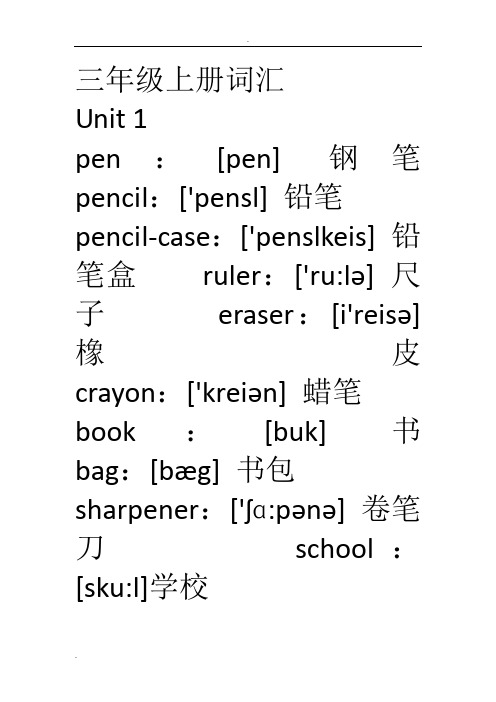
三年级上册词汇Unit 1pen:[pen] 钢笔pencil:['pensl] 铅笔pencil-case:['penslkeis] 铅笔盒ruler:['ru:lə] 尺子eraser:[i'reisə] 橡皮crayon:['kreiən] 蜡笔book:[buk] 书bag:[bæg] 书包sharpener:['ʃɑ:pənə] 卷笔刀school :[sku:l]学校Unit 2head:[hed] 头face[feis] 脸nose:[nəuz] 鼻子mouth:[mauθ] 嘴eye:[ai] 眼睛ear:[iə] 耳朵arm:[ɑ:m] 胳膊finger['fiŋgə] 手指leg:[leg]腿foot:[fut] 脚body:['bɔdi] 身体Unit 3red:[red] 红色的yellow:['jeləu] 黄色的green:[gri:n] 绿色的blue:[blu:] 蓝色的purple:['pə:pl] 紫色的white:[hwait] 白色的black:[blæk] 黑色的orange:['ɔ:rindʒ] 橙色的pink:[piŋk] 粉色的brown:[braun] 棕色的Unit 4cat:[kæt] 猫dog:[dɔg] 狗monkey:['mʌŋki] 猴子panda:['pændə]熊猫rabbit:['ræbit]兔子duck:[dʌk] 鸭子pig:[pig] 猪bird:[bə:d] 鸟bear:[bɛə] 熊elephant:['elifənt] 大象mouse:[maus] 老鼠squirrel:['skwirəl] 松鼠Unit 5cake:[keik] 蛋糕bread:[bred] 面包hot dog:[hɔt][dɔg] 热狗hamburger :['hæmbə:gə]汉堡包chicken:['tʃikin] 鸡肉French fries 榨薯条Coke 可乐juice:[dʒu:s] 果汁milk:[milk] 牛奶water:['wɔ:tə] 水tea:[ti:] 茶coffee:['kɔfi] 咖啡Unit 6one:[wʌn] 一two:[tu:] 二three:[θri:] 三four:[fɔ:] 四five:[faiv] 五six:[siks] 六seven:['sevn] 七eight:[eit] 八nine:[nain] 九ten :[ten]十doll:[dɔl] 玩具娃娃boat:[bəut] 小船ball:[bɔ:l] 球kite:[kait] 风筝balloon:[bə'lu:n] 气球car :[kɑ:]小汽车plane:[plein] 飞机三年级下册词汇U nit 1boy:[bɔi] 男孩girl:[gə:l] 女孩teacher:['ti:tʃə] 教师student:['stju:dənt] 学生this:[ðis] 这个friend:[frend] 朋友I’m=I am 我是nice:[nais] 好的愉快的my:[mai] 我的good morning :[gud]['mɔ:niŋ]早上好good afternoon::[gud]['ɑ:ftə'nu:n] 下午好meet:[mi:t]遇见;碰见goodbye:[,gud'bai] 再见Unit 2father:['fɑ:ðə]爸爸dad:[dæd] 爸爸口语mother:['mʌðə] 母亲;妈妈mom:[mɔm] 妈妈口语man:[mæn] 男人woman:['wumən] 女人grandmother['grænd,mʌðə] 外祖母grandma:['grændmɑ:] (口语)(外)祖母grandfather:['grænd,fɑ:ðə](外)祖父grandpa:['grændpɑ:] (口语)(外)祖父sister:['sistə] 姐妹brother:['brʌðə] 兄妹let’s=let us 让我们great:[greit] 太好了really:['riəli] 真地;确切地and:[ænd] 和;并且Unit 3eleven:[i'levn] 十一twelve:[twelv] 十二thirteen:['θə:ti:n] 十三fourteen:['fɔ:'ti:n] 十四fifteen:['fif'ti:n] 十五sixteen:['siks'ti:n] 十六seventeen:[,sevn'ti:n] 十七eighteen:['ei'ti:n] 十八nineteen:['nain'ti:n] 十九twenty:['twenti] 二十how many :[hau]:['meni]多少can:[kæn] 能够;可以look at:[luk][æt] 看;瞧too :[tu:]也;太U nit 4peach:[pi:tʃ] 桃pear:[pɛə] 梨orange:['ɔ:rindʒ] 橙子watermelon:['wɔ:tə,melən]西瓜apple:['æpl] 苹果banana:[bə'nɑ:nə] 香蕉strawberry:['strɔ:bəri] 草莓grape:[greip] 葡萄like:[laik] 喜欢some:[sʌm] 一些;某些thanks 多谢Unit 5bus:[bʌs] 公共汽车bike:[baik] 自行车taxi:['tæksi] 出租车jeep:[dʒi:p] 吉普车desk:[desk] 课桌chair:[tʃɛə] 椅子Walkman 随身听lamp:[læmp] 台灯your:[juə] 你的;你们的zoo:[zu:] 动物园Unit 6small:[smɔ:l] 小的big:[big] 大的long:[lɔŋ] 长的short:[ʃɔ:t] 短的;矮的giraffe:[dʒi'rɑ:f] 长颈鹿deer:[diə] 鹿四年级上册词汇Unit 1window:['windəu] 窗户have:[hæv] (我们)有board:[bɔ:d] 写字板new:[nju:] 新的light:[lait] 灯,灯管picture:['piktʃə] 画,图画where:[hwɛə] 在哪里door:[dɔ:] 门computer:[kəm'pju:tə] 计算机floor:[flɔ:] 地板teacher’s desk 讲台classroom:['klɑ:srum] 教室wall:[wɔ:l] 墙many:['meni] 许多的fan:[fæn] 扇子,电扇our:['auə]我们的clean:[kli:n] 打扫,清洁,擦干净的classmate['klɑ:smeit] 同学good idea:[gud][ai'diə] 好主意tall:[tɔ:l] 高的have a look:[hæv][ei][luk] 看一看all right :[ɔ:l] [rait]好吧,好的we:[wi:] 我们seat:[si:t] 座位good job:[gud][dʒɔb] 干的好ear:[iə] 在……的旁边you:[ju:] 你what:[hwɔt] 什么see:[si:] 看in :[in]在……里面me:[mi:] 我the:[ðə] 这个,这里look at:[luk][æt] 看……U nit 2Chinese book 语文书pencil:['pensl] 铅笔English book 英语书twenty-one:['twenti,wʌn] 二十一math book:[mæθ][buk] 数学书thirty-one:['θə:ti][wʌn] 三十一schoolbag:[ˈsku:lˌbæg] 书包forty-one:['fɔ:ti][wʌn] 四十一story-book:['stɔ:ri][buk] 故事书fifty:['fifti] 五十notebook:['nəutbuk] 笔记本too many :[tu:]['meni]太多了colour:['kʌlə] 颜色fat:[fæt] 胖的heavy:['hevi] 重的;沉重的may:[mei] 可以what’s=what is sure:[ʃuə] 当然可以sorry:['sɔri] 对不起here you are:[hiə][ju:][ɑ:] 给你Unit 3long hair:[lɔŋ][hɛə] 长头发short hair:[ʃɔ:t][hɛə] 短头发thin:[θin] 瘦的strong:[strɔŋ] 健壮的quiet:['kwaiət] 安静的friend(s):[frend]朋友(复数)Chinese 中国的like:[laik] 喜欢his:[hiz] 他的photo:['fəutəu] 照片he’s=he ishas (他/她)有name:[neim] 名字he:[hi:] 他teacher:['ti:tʃə] 教师student:['stju:dənt] 学生music:['mju:zik] 音乐science:['saiəns] 科学sports:[spɔ:ts] 体育运动computer game:[kəm'pju:tə][geim] 电脑游戏painting:['peintiŋ] 绘画her 她的she’s=she is you’re=you are she:[ʃi:] 她right:[rait] 对的;正确的boy :[bɔi]男孩girl:[gə:l] 女孩friend:[frend] 朋友Unit 4study:['stʌdi] 书房bathroom:['bæθrum] 卫生间bedroom:['bedrum] 卧室living room:['liviŋ][ru:m]客厅kitchen:['kitʃin] 厨房it’s=it ishey:[hei] 嘿fish:[fiʃ] 鱼isn’t= is not here 这里home[həum] 家room:[ru:m] 房间school:[sku:l] 学校classroom:['klɑ:srum] 教室phone:[fəun] 电话bed:[bed]床sofa:['səufə] 沙发shelf:[ʃelf] 书架fridge:[fridʒ] 冰箱table:['teibl] 桌子they:[ðei] 他们aren’t=are not they’re=they are key:[ki:] 钥匙open:['əupən] 打开look:[luk] 看please:[pli:z] 请on 在……上面no 不;不是window:['windəu] 窗户desk:[desk] 课桌;书桌door:[dɔ:] 门chair:[tʃɛə] 椅子bed:[bed] 床Unit 5rice:[rais] 米饭fish:[fiʃ] 鱼noodle(s) :['nu:dl]面条(复数)beef:[bi:f] 牛肉vegetable:['vedʒitəbl] 蔬菜soup:[su:p] 汤have:[hæv] 吃dinner:['dinə] 晚餐;正餐wait 等I’d like=I would like bread 面包:[bred] milk:[milk] 牛奶egg:[eg] 蛋water:['wɔ:tə] 水hungry:['hʌŋgri] 饥饿的for:[fɔ:] 为;给thank you:[θæŋk] [ju:]谢谢你knife:[naif] 刀chopsticks:['tʃɔpstiks] 筷子(复数)spoon:[spu:n] 勺子plate:[pleit] 盘子fork:[fɔ:k] 叉子help:[help] 帮助;帮忙pass:[pɑ:s] 传递ready:['redi] 准备好了try :[trai]常识;试一下help yourself:[help] [juə'self]随便吃show [ʃəu] 展示yummy:['jʌmi] 好吃的food:[fu:d] 食物use:[ju:z] 使用chicken:['tʃikin] 鸡肉U nit 6family :['fæmili]家庭parents 父母uncle:['ʌŋkl] 叔叔;舅舅aunt:[ɑ:nt] 姑姑;婶;姨people:['pi:pl] 人father:['fɑ:ðə] 父亲;爸爸baby:['beibi] 婴儿member:['membə] 成员only:['əunli] 只有;仅仅puppy:['pʌpi] 小狗gee:['dʒi:] 用以表示惊奇、赞赏come:[kʌm] 来who:[hu:] 谁sister:['sistə] 姐妹brother:['brʌðə] 兄弟baseball player:['beis,bɔ:l] ['pleiə]棒球运动员driver :['draivə]司机doctor:['dɔktə] 医生farmer:['fɑ:mə] 农民nurse:[nə:s] 护士look:[luk] 看上去;看;瞧young:[jʌŋ] 年轻的四年级下册词汇Unit 1computer:[kəm'pju:tə] 计算机board:[bɔ:d] 写字板fan:[fæn] 风扇light:[lait] 灯this:[ðis] 这;这个is:[iz] 是my:[mai] 我的that:[ðæt] 那;那个your:[juə] 你的teacher’s desk 讲台picture:['piktʃə] 图画;照片wall 墙壁floor:[flɔ:] 地板it :[it]它class:[klɑ:s] 课程This is my computer.这是我的电脑That is your computer. 这是你的电脑Ls this a teacher’s desk? Yes,it is.这是讲台桌吗。
人教版小学英语3-6年级知识点小结
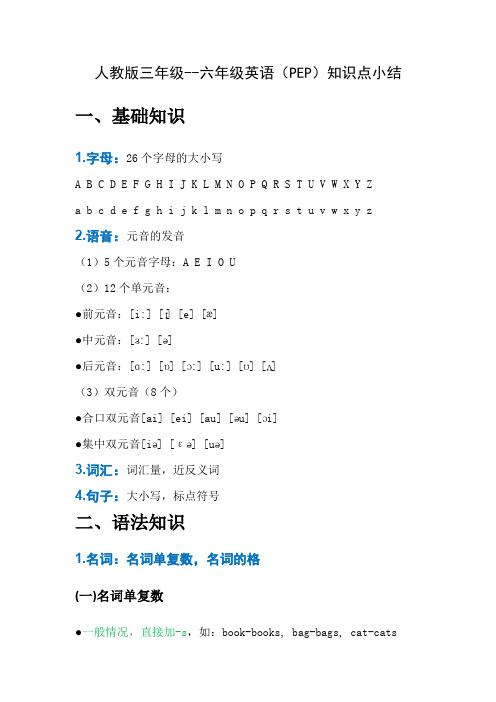
人教版三年级--六年级英语(PEP)知识点小结一、基础知识1.字母:26个字母的大小写A B C D E F G H I J K L M N O P Q R S T U V W X Y Za b c d e f g h i j k l m n o p q r s t u v w x y z2.语音:元音的发音(1)5个元音字母:A E I O U(2)12个单元音:●前元音:[i:] [ɪ] [e] [æ]●中元音:[ɜ:] [ə]●后元音:[ɑ:] [ɒ] [ɔ:] [u:] [ʊ] [ʌ](3)双元音(8个)●合口双元音[ai] [ei] [au] [əu] [ɔi]●集中双元音[iə] [εə] [uə]3.词汇:词汇量,近反义词4.句子:大小写,标点符号二、语法知识1.名词:名词单复数,名词的格(一)名词单复数●一般情况,直接加-s,如:book-books, bag-bags, cat-cats●以s. x. sh. ch结尾,加-es,如:bus-buses, box-boxes, brush-brushes, watch-watches●以“辅音字母+y”结尾,变 y 为 i, 再加-es,如:family-families, strawberry-strawberries●以“f 或 fe”结尾,变 f 或 fe 为 v, 再加-es,如:knife-knives 不规则名词复数:man-men,woman-women,policeman-policemen,policewoman-policewomen,mouse-mice,child-children,f oo t-f ee t,t oo th-t ee th,fish-fish,people-people,Chinese-Chinese,Japanese-Japanese不可数名词的复数就是原形:paper,juice, water, milk, rice, tea(二)名词的格(1) 有生命的东西的名词所有格:a) 单数后加 's如: Lucy's ruler, my father's shirtb) 以s 结尾的复数名词后加’如: his friends' bagsc) 不以s 结尾的复数后加's如:children's shoes并列名词中,如果把 's加在最后一个名词后,表示共有, 如:Tom and Mike's car 汤姆和迈克共有的小汽车要表示所有物不是共有的,应分别在并列名词后加's, 如:Tom's and Mike's cars 汤姆和麦克各自的小汽车(2) 表示无生命东西的名词通常用“of +名词”来表示所有关系:如: a picture of the classroom a map of China2.冠词:不定冠词,定冠词种类(1) 不定冠词:a / an ,元音开头的可数名词前用an :(2) 定冠词:the定冠词的用法:●特指某(些)人或某(些)物: The ruler is on the desk.●复述上文提到的人或物:He has a sweater. The sweater is new.●谈话双方都知道的人或物:The boys aren't at school.●在序数词前: John's birthday is February the second.●用于固定词组中: in the morning / afternoon / evening (3)不用冠词的情况:➢专有名词前:China is a big country.➢名词前有定语:this , that , my , your , some, any , no 等:This is my baseball.➢复数名词表示一类人和事:Monkeys can't swim. They are teachers.➢在节日,日期,月份,季节前:Today is Christmas Day. It's Sunday.➢一日三餐前:We have breakfast at 6:30.➢球类棋类运动前:They often play football after class. He plays chess at home.* 但乐器前要用定冠词:I play the guitar very well.➢学科名称前:My favorite subject is music.➢在称呼或头衔的名词前:This is Mr Li.➢固定词组中:at noon, at night, by bus3.代词、形容词、副词※代词:人称代词,物主代词※形容词,副词:比较级,最高级(一)、形容词的比较级1. 形容词比较级在句子中的运用:两个事物或人的比较用比较级,比较级后面一般带有单词 than。
小学3到6年级英语单词大全
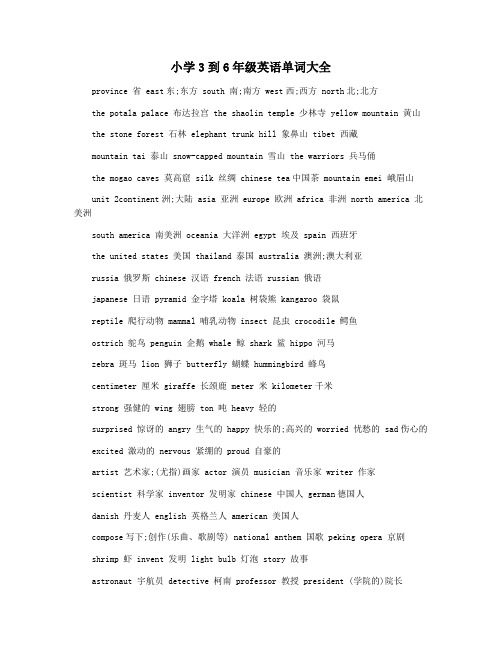
小学3到6年级英语单词大全province 省 east东;东方 south 南;南方 west西;西方 north北;北方the potala palace 布达拉宫 the shaolin temple 少林寺 yellow mountain 黄山the stone forest 石林 elephant trunk hill 象鼻山 tibet 西藏mountain tai 泰山 snow-capped mountain 雪山 the warriors 兵马俑the mogao caves 莫高窟 silk 丝绸 chinese tea中国茶 mountain emei 峨眉山unit 2continent洲;大陆 asia 亚洲 europe 欧洲 africa 非洲 north america 北美洲south america 南美洲 oceania 大洋洲 egypt 埃及 spain 西班牙the united states 美国 thailand 泰国 australia 澳洲;澳大利亚russia 俄罗斯 chinese 汉语 french 法语 russian 俄语japanese 日语 pyramid 金字塔 koala 树袋熊 kangaroo 袋鼠reptile 爬行动物 mammal 哺乳动物 insect 昆虫 crocodile 鳄鱼ostrich 鸵鸟 penguin 企鹅 whale 鲸 shark 鲨 hippo 河马zebra 斑马 lion 狮子 butterfly 蝴蝶 hummingbird 蜂鸟centimeter 厘米 giraffe 长颈鹿 meter 米 kilometer千米strong 强健的 wing 翅膀 ton 吨 heavy 轻的surprised 惊讶的 angry 生气的 happy 快乐的;高兴的 worried 忧愁的 sad伤心的excited 激动的 nervous 紧绷的 proud 自豪的artist 艺术家;(尤指)画家 actor 演员 musician 音乐家 writer 作家scientist 科学家 inventor 发明家 chinese 中国人 german德国人danish 丹麦人 english 英格兰人 american 美国人compose写下;创作(乐曲、歌剧等) national anthem 国歌 peking opera 京剧shrimp 虾 invent 发明 light bulb 灯泡 story 故事astronaut 宇航员 detective 柯南 professor 教授 president (学院的)院长principal(中小学校的)校长 sun 太阳 moon月亮 ocean 海洋cloud 云彩 robot 机器人 housework 家务劳动 pollution 污染pill 药片 peace和平 earth地球 spaceship宇宙飞船 mars 火星attend 上学;应邀出席 software 软件 develop 发展 basic 基础的personal 个人的 leader领导 knock 敲 quickly 快速nut 干果;坚果 claw 爪子 lock 门锁common 普通的;一般的 moose 北美鹿;驼鹿modern 现代的 once 从前 teeny tiny不大的,微型的make sure 确定 litter box 垃圾箱 sick 生病的bored乏味的 push 发推 everywhere到处 poor心疼的fantasy 幻想 reason 理由 sign 标牌 photography 摄影,照相 folder 夹子fire 火 bloom 花开 temperature 温度 degree 度数 during 在……期间seed 种子 return 返回 example 例子 wake up 醒来 such as 例如disappearing 正在消失 cost 花费 however 然而 decide 同意italian 意大利人,意大利语 korean 韩国人,韩语 vancouver 温哥华(加拿大城市) ottawa 渥太华(加拿大城市)quebec魁北克(加拿大省)montreal 蒙特利尔(加拿大城市) turkey 火鸡 pumpkin pie 南瓜馅饼cranberry 梅果 lunar calendar 阴历 kofi a. ann 安南(联合国秘书长)ghana 加纳(非洲国家名) secretary-general 联合国秘书长 nobel prize 诺贝尔奖 peace 和平 marie curie 居里夫人 radium 镭(金属元素) physics 物理chemistry 化学 graduate 毕业 chicago 芝加哥(美国城市)sail 航行 sailor 船员 finish 顺利完成 alone 独自 zeppelin 魏柏林飞艇germany 德国(国家名) beauty 美丽 magic 有魔力的 agree 同意kilometer 公里 follow 追随 continue 稳步machine 机器 lift 举起 hold 拿住,抓住 sense 感觉到,检测到outer space 宇宙空间 volcano 火山 construct 修建 wizard 男巫,术士 suddenly 忽然 hit 打击,撞击 sly 狡猾的 cave 洞穴。
- 1、下载文档前请自行甄别文档内容的完整性,平台不提供额外的编辑、内容补充、找答案等附加服务。
- 2、"仅部分预览"的文档,不可在线预览部分如存在完整性等问题,可反馈申请退款(可完整预览的文档不适用该条件!)。
- 3、如文档侵犯您的权益,请联系客服反馈,我们会尽快为您处理(人工客服工作时间:9:00-18:30)。
小学英语知识点总结学生易错词汇1. a, an的选择: 元音字母开头的单词用an,辅音字母开头的单词用a.2 am , is , are的选择: 单数用is , 复数用are. I 用 am , you 用 are.3 have , has 的选择: 表示某人有某物。
单数用has , 复数用have. I ,you 用 have .4. there is, there are 的选择:表示某地有某物,某人。
单数用there is , 复数用there are.5. some, any 的选择:肯定句用some, 疑问句和否定句用any.6. 疑问词的选择:what (什么) who (谁) where (哪里) whose (谁的) why(为什么)when(什么时候)which(哪一个)how old (多大) how many (多少)how much(多少钱)二:形容词比较级详解当我们需要对事物作出比较时,需要用到比较级。
比较级的句子结构通常是:什么 + 动词be (am , is , are ) + 形容词比较级 + than(比)+ 什么 ,如:I’m taller and he avier than you. (我比你更高和更重。
)An elephant is bigger than a tiger. (一只大象比一只老虎更大。
)形容词的比较级是在形容词的基础上变化而来的,它的变化规则是:①一般的直接在词尾加er ,如 tall - taller , strong - stronger ,②以e结尾的,直接加r ,如 fine – finer ,③以辅音字母加y结尾的,先改y为i再加er,如funny - funnier④双写最后的字母再加er,如big – bigger, thin – thinner ,hot – hotter☆注意☆比较的两者应该是互相对应的可比较的东西。
典型错误:My hair is longer than you.(我的头发比你更长。
)比较的两者是我的头发、你(整个人),那么比较的对象就没有可比性。
应该改为:My hair is longer than yours. 或My hair is longer than your hair.比较级专项练习一、从方框中选出合适的单词完成句子heavy tall long big(1) How is the Yellow River?(2) How is Mr Green? He’s 175cm.(3) How are your feet? I wear size 18.(4)How is the fish? It’s 2kg.二、根据句意写出所缺的单词(1) I’m 12 years old. You’re 14. I’m than you.(2) A rabbit’s tail is than a monkey’s tail.(3) An elephant is than a pig.(4) A lake is than a sea.(5) A basketball is than a football.三、根据中文完成句子.(1)? 我比我的弟弟大三岁. I’m than my brother.(2)? 这棵树要比那棵树高. This tree than that one.(3)? 你比他矮四厘米. You are than he.(4)? 谁比你重? than you?四、根据答句写出问句(1) I’m 160 cm.(2) I’m 12 year s old.(4) Amy’s hair is 30 cm long.三:动词过去式详解动词的过去式的构成规则有:A、规则动词①????一般直接在动词的后面加ed如worked , learned , cleaned , visited②以e结尾的动词直接加d如lived , danced , used③????以辅音字母加y结尾的动词要改y为i再加ed(此类动词较少)如study – studied carry – carried worry – worried (play、stay)④双写最后一个字母(此类动词较少)如stoppedB、不规则动词(此类词并无规则,须熟记)小学阶段要记住以下动词的原形和过去式:sing – sang , eat – ate , see – saw , have – had , do – did , go – went , take – took , buy – bought , get – got , read – read ,fly – flew , am/is – was ,are – were , say – said , leave – left , swim – swam , tell – told , draw – drew , come – came , lose – lost , find – found , drink – drank , hurt – hurt , feel – felt四:动词现在分词详解动词的ing形式的构成规则:①??? 一般的直接在后面加上ing , 如doing , going , working , singing , eating②以e 结尾的动词,要先去e再加ing,如having , writing③双写最后一个字母的(此类动词极少)有:running , swimming , sitting , getting五:人称和数人称代词物主代词主格宾格第一人称单数 I(我) me my(我的)复数 we(我们) us our(我们的)第二人称单数 you(你) you your(你的)复数 you(你们) you your(你们的)第三人称单数 he(他) him his(他的) she(她) her her(她的) it(它) it its(它的)复数they(他们/她们/它们) them their(他们的/她们的/它们的)六:句型专项归类肯定句:是指用肯定的语气来陈述的句子,如:I’m a student. She is a doctor. He works in a hospital.There are four fans in our classroom. He will eat lunch at 12:00. I watched TV yesterday evening.2、否定句:含有否定词或表示否定意义词的句子,如:I’m not a student. She is not (isn’t) a doctor.He does not (doesn’t) work in a hospital. There are not (aren’t) four fans in our classroom.He will not (won’t) eat lunch at 12:00. I did not (didn’t) watch TV yesterday evening.☆注意☆小结:否定句主要是在肯定句的基础上加上了否定词“not”。
有动词be的句子则“not”加在be后面,可缩写成“isn’t,aren’t”,但am not 一般都分开写。
没有动词be的句子则要先在主要动词的前面加上一个助动词(do,does,did),然后在它后面加上“not”,你也可以把它们缩写在一起如“don’t , doesn’t , didn’t )。
这三个助动词要根据人称和时态来选择,其中“does”只用于一般现在时主语是第三人称单数的情况,而“did”只用于一般过去时,不论主语是什么人称和数,都用“did” 。
3、一般疑问句:是指询问事实的句子,此类句子必须用“yes”,或“no”来回答。
如:Are you a student? Yes, I am / No, I’m not.Is she a doctor? Yes, she is. / No, she isn’t.Does he work in a hospital? Yes, he does. / No, he doesn’t.Are there four fans in our classroom? Yes, there are. / No, there aren’t.Are you going to buy a comic book tonight? Yes, I am. / No, No, I am not. (Yes, we are. / No, we aren’t.)Will he eat lunch at 12:00? Yes, I will. / No, I will not(won’t).Are they swimming? Yes, they are. / No, they aren’t.Did you watch TV yesterday evening? Y es, I did. / No, I didn’t.☆注意☆小结:一般疑问句是在肯定句的基础上,①把动词be调到首位,其他照写,末尾标点符号变成问号即可。
②没有动词be的句子则要在句首加上一个助动词(do,does,did)再把紧跟在后面的动词变回原形,末尾标点符号变成问号即可。
这三个助动词也要根据人称和时态来选择,其中“does”只用于一般现在时主语是第三人称单数的情况,而“did”只用于一般过去时,不论主语是什么人称和数,都用“did” 。
一般疑问句有个重要的原则就是问和答要一致,即问句里的第一个单词(助动词)和简略答句里的这个词是一致的。
4、特殊疑问句:以特殊疑问词(what , where , who , which , when , whose , why , how等)开头引导的句子。
此类句子应该问什么就答什么,不能用“yes 、no”来回答。
如:What is this? It’s a computer.What does he do? He’s a doctor.Where are you going? I’m going to Beijing.Who played football with you yesterday afternoon? Mike.Which season do you like best? Summer.When do you usually get up? I usually get up at 6:30.Whose skirt is this? It’s Amy’s.Why do you like spring best? Because I can plant trees.How are you? I’m fine. / I’m hap py.How did you go to Xinjiang? I went to Xinjiang by train.☆其中how又可以和其他一些形容词连用组成特殊疑问词组用来提问,如: how many (多少(数量)), how much(多少(钱)), how tall(多高), how long(多长), how big(多大), how heavy(多重)例句:How many pencils do you have? I have three pencils.How many girls can you see? I can see four girls.How many desks are there in your classroom? There are 51.☆小结:how many 用来提问可数名词的数量,主要有以上三种句式搭配,How many + 名词复数 + do you have? 你有多少……?How many + 名词复数 + can you see? 你能看见多少……?How many + 名词复数+ are there…? 有多少……?七:完全、缩略形式: I’m=I am he’s=he is she’s=she is they’re=they are you’re=you are there’s=there is they’re=they are can’t=can not don’t=do not doesn’t=does not isn’t=is not aren’t=are not let’s=let us won’t=will not I’ll=I will wasn’t=was not总结:通常情况下,'m即am,'s即is(但let’s=let us), 're即are ,n't即not (但can’t=can not)八:与字母相关的题型 ( 注:五个元音字母是 Aa Ee Ii Oo Uu )二.写出下列字母的左邻右舍。
